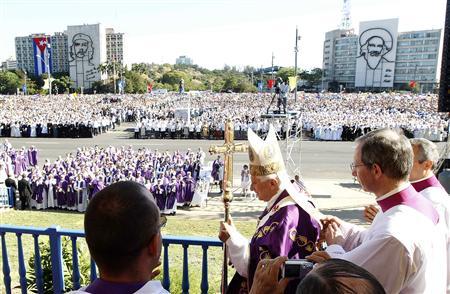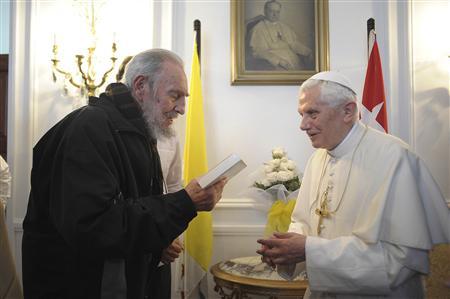(Reuters) – Pope Benedict called for an end to the U.S. trade embargo against Cuba and met with revolutionary icon Fidel Castro on Wednesday as he ended a trip in which he urged the communist island to change.

He also spoke at a public Mass in Havana’s sprawling Revolution Square where the Vatican said 300,000 people gathered to hear the 84-year-old pontiff.
In a trip laced with calls for change in Cuba, his last message was aimed at the United States, its longtime ideological foe, which for 50 years has imposed a trade embargo trying to topple the Caribbean island’s communist government.
Speaking in a departure ceremony at a rainy Havana airport, Benedict said Cuba could build “a society of broad vision, renewed and reconciled,” but it was more difficult “when restrictive economic measures, imposed from outside the country, unfairly burden its people.”
“The present hour urgently demands that in personal, national and international co-existence we reject immovable positions and unilateral viewpoints,” the German pope, dressed in white vestments, said in his soft voice and heavily accented Spanish.
Beginning at his arrival in eastern Santiago de Cuba on Monday, Benedict sprinkled his speeches with thinly-veiled references to Cuban dissidents, political prisoners, Cuban exiles and the need for the Caribbean island to push ahead with its economic reforms.
The pontiff rode in his Popemobile on the way to the airport and was bid farewell by streets lined with Cubans waving flags and cheering him.
President Raul Castro, who attended the pope’s Masses in Santiago on Monday and in Havana on Wednesday, saw off the pontiff, who is frail and moves slowly, before he boarded his jet for Rome and flew into stormy skies.
The two men clasped hands and Raul Castro dipped his head briefly in a show of reverence that he had made at their other meetings. Both he and his older brother were educated by Jesuits, the worldwide Catholic order.
MUTUAL UNDERSTANDING
“Your visit has taken place in an atmosphere of mutual understanding,” President Castro said. “Your holiness, we have found many and deep agreements, although it’s natural that we don’t think the same on all issues.”
Under 49 years of rule by Fidel Castro, the Roman Catholic Church lost its schools, hospitals, access to media and its prominent role in Cuban society.
But Raul Castro, who succeeded his ailing brother four years ago, has improved relations with the Church and is using it as interlocutor on issues such as political prisoners and dissidents as he undertakes potentially disruptive reforms to the country’s struggling Soviet-style economy.
He is encouraging more private enterprise to offset plans to cut 1 million jobs from government payrolls, which is 20 percent of the country’s labor force of 5.2 million.
But while Benedict is urging Cuba to make deeper changes, the government sees its reforms as a way of strengthening communist rule, not weakening it.
The pope mentioned several times during his visit that he was happy relations had improved, but also said they needed to get better so the Church could help buffer against “trauma” or social upheaval.
“This must continue forwards, and I wish to encourage the country’s government authorities to strengthen what has already been achieved and advance along this path,” he said.
The Church, he added, “seeks to give witness by her preaching and teaching, both in catechesis and in schools and universities.”
After the Mass, Fidel Castro, the president’s older brother, visited Benedict at the Vatican embassy where the two octogenarian world leaders with widely divergent political views chatted for 30 minutes in what a Vatican spokesman called a “very cordial” atmosphere.
They discussed serious issues such as Church liturgy and the state of the world, but also joked about their age — Benedict is 84. At one point, Fidel Castro asked a simple question – what does a pope do?

“The pope told him of his ministry, his trips, and his service to the Church,” said spokesman Federico Lombardi
ARMED GUARDS.
Photographs showed the elder Castro and the pope shaking hands and smiling, with Castro wearing a dark track suit and a scarf around his neck that seemed out of place on a warm day.
Witnesses said the former comandante arrived in a green Mercedes SUV with armed guards in a surrounding phalanx of black Mercedes sedans.
Two assistants helped Fidel Castro, who has been in frail health since 2006, out of the car, then up the steps of the stately white embassy in Havana’s Miramar district.
The friendly meeting contrasted with the beginning of Benedict’s visit when he sharply criticized the communist system that Castro put in place after taking power in a 1959 revolution and continues to defend as the last, best hope of mankind.
On the flight to Mexico beginning his Latin American trip on Friday, the pope said communism had failed in Cuba and that the country needs a new economic model.
In a possible dig at Marxism on Wednesday, Benedict said in his Mass that some “wrongly interpret this search for the truth, leading them to irrationality and fanaticism; they close themselves in ‘their truth,’ and try to impose it on others.”
Advertisement
He said the said the search for truth “always supposes the exercise of authentic freedom.”
The Church wants to get back some of the ground it lost after the revolution, so the pope urged the government to let it do more social work and play a bigger role in education.
Marino Murillo, a vice president in the Council of Ministers and the country’s economic reforms czar, made it clear that change to Cuba’s one-party political system is not in the works.
“In Cuba there won’t be political reform,” he said at a news conference. “We are talking about the update of the Cuban economic model to make our socialism sustainable.”
(Additional reporting by Simon Gardner, Rosa Tania Valdes and Nelson Acosta; Editing by David Adams and Kieran Murray)

